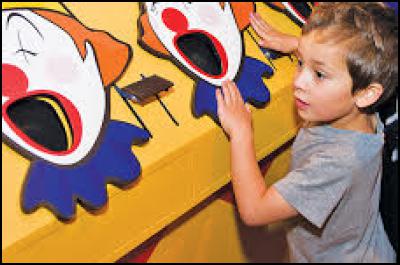Exploring How We See the World at MOTAT
Media Release
Exploring How We See the World at MOTAT

Eyetrackers, an exhibition exploring how we look at art, will be open at MOTAT from Saturday 20 February.
The exhibition investigates the fascinating borderland between art and visual neuroscience. Art works and state-of-the art eye-tracking technologies are brought together to address the question that has intrigued scientists and artists alike: “How do we see the world?”
MOTAT Education Manager, Julie Baddiley says that the Museum is delighted to be collaborating on this exhibition with experts from the University of Auckland. “Educators, artists and scientists have come to recognise the importance of blending the arts and sciences for the enrichment of student learning. This supports MOTAT’s aim to incorporate elements of STEAM (Science, Technology, Engineering, Art and Maths) into all the experiences we offer. The Eyetrackers exhibition fits this objective perfectly,” said Ms Baddiley.
Video presentations recreate the shifting gaze patterns of individual viewers as they look at works of art. Installations enable visitors to interact directly with eye tracker technology to monitor patterns of looking behaviour as they engage with different images. Each piece looks at different phenomena, for example gender perception (the differences between the way a male and a female experience art), change blindness and pupil dilation.
For most people, ‘seeing’ is an ever-present and central feature of our consciousness from the moment we open our eyes in the morning until we lapse back into sleep again. Naturally and reflexively, we take the evidence of our own eyes for granted – ‘seeing is believing’ - well, not necessarily!
Vision is a paradox. It presents us with self-evident truths about the world in front of our eyes, but at the same time, it remains profoundly mysterious. How do patterns of light entering the eyes give rise to visual experiences? This is where the interests and concerns of visual art and visual science intersect – it’s the territory explored by Eyetrackers.
There will be an education component to the exhibition consisting of:
• A
programme which is aligned with the NZ curriculum utilising
the educational opportunities offered by the
Eyetrackersinstallation. These will
be individually negotiated with interested school groups
and focused on learning experiences suitable for students
aged 13+.
•
• ‘Scientist-in-residence’ talks
hosted by University of Auckland staff will be available for
booked education groups of up to one-hour duration, during
scheduled weekdays, for the period of the
installation.
•
Eyetrackers
is curated by Tony Lambert (School of Psychology, University
of Auckland), Greg Minissale (Department of Art History,
University of Auckland), Gerald Weber (Department of
Computer Science, University of Auckland) and Christof
Lutteroth (Department of Computer Science, University of
Auckland). The exhibition is supported by the University of
Auckland’s Centre for Brain Research, Faculty of Science
and Faculty of Arts.
Entry to the Eyetrackers exhibition is included in the normal MOTAT general admission fee. No booking is required for the general public but school groups will need to book for the education sessions. Open from 10am – 4pm daily.
ENDS


 Air New Zealand: Raw Thrills - Air New Zealand's Most Popular Inflight Entertainment Revealed
Air New Zealand: Raw Thrills - Air New Zealand's Most Popular Inflight Entertainment Revealed Hustle Management: Celebrating 50 Years Of Music, Now And Then, With Mark Williams
Hustle Management: Celebrating 50 Years Of Music, Now And Then, With Mark Williams Massey University: Birdnapped Cockatoo Wins Quote Of The Year
Massey University: Birdnapped Cockatoo Wins Quote Of The Year LAWA: “Know Before You Go” – Check Summer Swimming Water Quality Online
LAWA: “Know Before You Go” – Check Summer Swimming Water Quality Online Official Aotearoa Music Charts: 2024 End Of Year Charts Have Been Published
Official Aotearoa Music Charts: 2024 End Of Year Charts Have Been Published Nielsen Book NZ: Nielsen BookData Announces 'In Too Deep' Is The Official New Zealand Number 1 Christmas Bestseller
Nielsen Book NZ: Nielsen BookData Announces 'In Too Deep' Is The Official New Zealand Number 1 Christmas Bestseller